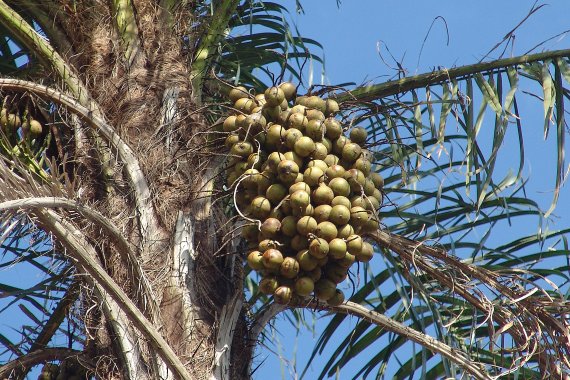© The macauba palm tree, picture from Wikimedia
Brazil is one of the largest producers of meat and feed in the world. Pig farmers in Brazil mainly use corn and soya feed because there is plenty available. But in the past few years feed prices in Brazil have been increasing. Moreover, feed production is associated with environmental problems such as deforestation and the emission of greenhouse gases. Ali, who is a PhD student at the Business Economics department of Wageningen University, examined alternative feed sources.
By-products
Ali studied co-products like wheat middlings, citrus pulp and sugar cane molasses, but also macauba kernel cake. The macauba palm tree is an emerging source of biodiesel. The by-product from the extraction of oil from the kernel, kernel cake, can be used as feed. The tree, which grows on pasture and marginal lands, can potentially produce 5 tons of oil per hectare and does not require arable land. As a result, the environmental impact of macauba feed is much lower than the impact of the current feed sources, Ali said. Partially replacing corn and soya meal in finishing pig diets with 20% of macauba kernel cake or a mix of 35% co-products will lower the land use impact by 10% per finished pig, he estimated. ‘As a result, Brazil can save arable land for food crops and deforestation can be avoided.’
Costs
Ali also made a valuation of the costs of the feeds. There is no commercial production of macauba feed in Brazil yet, but Ali estimates that the cost price for a diet based on macauba kernel cake is 14% lower than the current corn and soya based meal. A feed containing different co-products will cost marginally (5%) less, he explains in next month’s edition of the Journal of Cleaner Production. So his advice is: let’s do it.
More than half of the pig meat production chain in Brazil is controlled by a few big companies. ‘We contacted these companies, included them in the stakeholders meetings and presented our results to them’, said Ali. ‘I hope they will implement our findings.’ Apart from that, the Federal University de Vicosa, which is a research partner of WUR in this project, can spread the research findings in Brazil.
Policy
Implementing these conclusions would clearly change the feed sector policy, Ali stated. ‘The pig feed sector is completely directed at corn and soy. Co-products from the sugar cane, citrus and macauba production chains are now completely separated from the pig feed production chain. Co-products are not used. They have to integrate these sectors.’
Beshir Ali’s research was funded by the Dutch research organisation NWO-Wotro.

